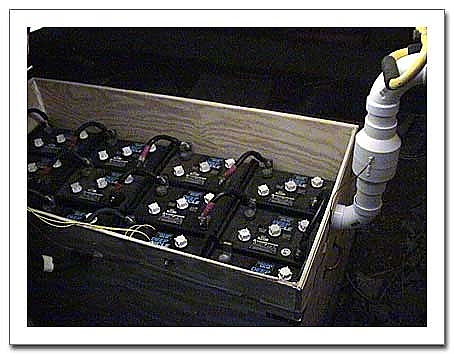Our "off the grid" cabin is a battery powered cabin. We are truly "off-the-grid" and get our electricity from the sun and wind. (We do have a backup generator.)
On sunny and/or windy days (and there are plenty of them), we get most of the electricity we need during the day directly from the solar panels and wind turbine. Any excess electricity we generate beyond what we use, is stored in batteries located in the crawlspace under the cabin. We then draw from the batteries at night, or when there is little sun or wind.
The batteries are in a plywood battery box I built. It is about 4' long, 3' wide and 2.5' high with a tight-fitting lid. It can hold up to twelve 6-volt batteries. We have a 24 volt system, so the batteries are wired in banks of 4 batteries in series. Then, each bank is wired in parallel with other banks. Right now, we have 8 batteries, so 2 banks of 4.
(Here is a photo of the original battery system, which was replaced many years ago. You can see three banks of four batteries and the evacuation fan.)

And, they are old.
Batteries used for off-the-grid applications are deep-cycle batteries--different from what you use in your car. To start your car, you want a battery that can provide a huge amount of current for a very short time to start the car, then be charged back to full capacity quickly. For an off-the-grid application, you want a battery that can provide a more modest amount of current over a long period of time and use up to 40% to 50% of its capacity before being recharged.
The batteries we have now are wet-cell, deep-cycle batteries. That means they need to have distilled water added occasionally. And, that when they charge they give off hydrogen gas. Thus the battery box, which encloses the batteries and is vented to the outside. A small 24V ventilation fan comes on whenever the batteries are being charged, and exhausts any gasses in the box to the outside of the cabin. A critical safety feature!
Deep-cycle batteries have a lifetime specified in discharge cycles. A cycle is usually defined as a single discharge to 60% or 50% capacity. Lifetimes can range from 800 or 900 cycles up to 1500 or so cycles. It depends on the battery. And, the more cycles the more expensive the battery. After this number of cycles of discharge and recharge, batteries need to be reconditioned or replaced.
Our batteries are about 10 years old. They only cycle when we are there to use electricity. Or, when we are not there and we have several days where they don't charge. (There is electrical use even when we are not there since we leave the propane forced-air heater on and set to 45°F.) Still, they have had many cycles, and some to levels well below 50% or 60% of their capacity. Before we move in full-time, we need to replace the batteries.
To follow my research and decision on new batteries, click through to "More..."
Battery technology is improving rapidly. The introduction of hybrid and electic powered cars as well as dramatic growth in solar and wind power has fueled improvements in battery technology. However, for applications such as ours, there are still only a few choices:
- Wet cell
- Gel cell
- Absorbent Glass Matt (AGM) cell
Each has its advantages and disadvantages.
Wet cell batteries tend to be the least expensive and can deliver years of use, they require periodic maintenance. Gel cell batteries don't require maintenance, but are more expensive. AGM batteries are more efficient, and are low maintenance, but are very expensive.
Based on recommendations from a trusted resource in the solar power industry, I evaluated three batteries: two wet cell batteries, one from Dekka and one from Trojan; and one AGM battery from Full River. As an engineer, I created a spreadsheet where I could calculate total capacity, run time based on our average power usage, up-front costs, long-term costs (how often would they need to be replace?), etc.
I think the overall winner is the Trojan L16RE-B. It has 370 amp-hours of capacity (at 20 hours of use), a 1600 cycle lifetime (at 40% discharge) and costs about $355 each. It is not the cheapest, the Dekka is. But, the Dekka has only a 900 cycle lifetime. It is not the most efficient or maintenance-free (the Full River is), but it is less expensive. Really, the only downsides are: it has about 10% less capacity than the Full River AGM and it requires maintenance (probably monthly).
But, I am going to need projects while living at the cabin and obsessive maintenance of the batteries is probably a good one. (That will drive Lynne crazy.)
We will likely get 12 batteries, increasing our current 2-bank system to a 3-bank system. By my calculations, we can run off the batteries for about 26 hours drawing an average of 480 watts continuously. (After that, if we don't have sun or wind, out comes the generator!)
